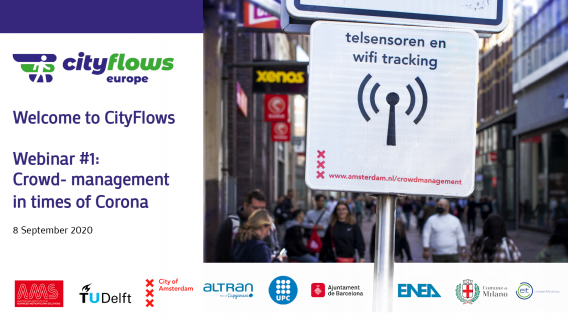On Tuesday, 8 September, forty-five participants gathered for the first CityFlows webinar on the topic of crowd-management in response to corona. Speakers came from three partner cities: Eelco Thiellier, Project Manager Crowd Monitoring System Amsterdam (CMSA); Valentino Sevino, Mobility Planning Director at City of Milan’s Environmental Mobility and Territory Agency (AMAT); and Aina Pedret, Mobility & Tourism Specialist at the City of Barcelona.
The participants were CityFlows project partners (37%), crowd-management researchers or academics (17%), crowd-management professionals working for public authorities (13%), crowd-management professionals working for companies or start-ups (10%), non-professionals interested in the topic (13%), and other (10%).
The meeting represented a successful launch of the EIT-KIC CityFlows webinar series which will continue with additional webinars in October, November and December.
Following a brief introduction to the CityFlows project, Eelco Thieller shared how the City of Amsterdam has quickly adapted its crowd monitoring infrastructure to respond to the corona crisis. Eelco showed the techniques that are used and how they are instituted throughout the city in crowded locations, or “hot spots”, such as shopping districts and market areas, the Red Light District, and in parks and at event locations. The focus is always on managing crowds or flows of people in the most privacy-preserving way with infrared sensors being a good example of how this is done in Vondelpark. Eelco also described the predictive models that were developed using the data which are helpful with determining what crowd-management actions should be undertaken by the City to ensure the health and safety of the residents and visitors.
Valentino Sevino shared a broader perspective on how the City of Milan has used data and modelling to respond to the corona emergency. Valentino showed how the modal-share in the city had drastically changed since the end of February through June as a result of the corona crisis. This shed light on levels on congestion throughout the city and showed a large reduction in all modalities during the lock down. Following the lock-down, public transport began operating at 25% which then required the city to undertake a complete rethinking of the mobility system with the goal of focusing on more temporal distribution, promotion of remote working, and promotion of active transport through street space reallocation to non-motorized transport. The data collected enabled them to predict and plan for different scenarios, especially considering the goal of abiding by social distancing guidelines during rush hours.
Aina Pedret from the City of Barcelona responded to the first two presentations by reflecting on the global challenge of ensuring confidence and safety for people in response to corona. To ensure this confidence and safety for both locals and tourists, the City of Barcelona is developing an application showing real time data of busyness at “hot spots”. And similar to the City of Amsterdam, the City of Barcelona is using cameras to monitor and manage occupancy and crowds at busy locations such as markets.
The webinar ended with an open discussion facilitated by Dorine Duives, CityFlows Principle Investigator at TU Delft.
Did you miss the webinar? It is possible to watch the recording via https://vimeo.com/460939134
___________________________________________________________________________________
CityFlows is an EIT-KIC project aims to improve the liveability of crowded pedestrian spaces through the use of Crowd Monitoring Decision Support Systems to manage pedestrian flows. The project is led by AMS Institute and brings together crowd-management and mobility practitioners and researchers in Amsterdam, Barcelona and Milan. The CityFlows project tests and evaluates various innovative crowd monitoring techniques in real-life settings where large crowds meet, such as mass events, tourist spaces and transfer hubs. The CityFlows project also prepares a CM-DSS for market launch which incorporates state-of-the-art monitoring techniques.
Join us for one or all of the next CityFlows webinars:
• Tuesday, 13 October, 2020 – 12:00-13:00 CET
• Tuesday, 3 November – 15:00-16:00 CET
• Tuesday, December 1 – 15:00-16:00 CET
Are you a practitioner or researcher working on a relevant crowd-management project and would like to share your work and findings with the CityFlows network? Send a short email explaining your project to CityFlows Communications Officer, Cornelia Dinca via cornelia.dinca@ams-institute.org.





